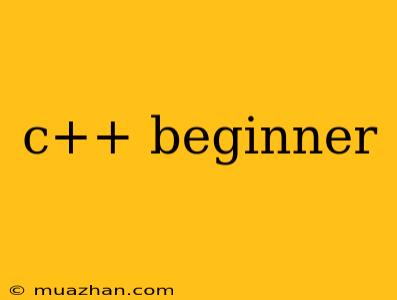C++ for Beginners: A Comprehensive Guide
C++ is a powerful, versatile, and widely used programming language that is popular for its performance and efficiency. If you're a beginner, getting started with C++ can seem daunting, but this comprehensive guide will help you navigate the basics and understand the fundamentals.
Why Learn C++?
- Performance: C++ is known for its speed and efficiency, making it ideal for resource-intensive applications.
- Control: C++ gives you a high level of control over system resources, allowing for optimal performance tuning.
- Portability: C++ code can be compiled and run on various platforms, making it highly portable.
- Community & Resources: C++ has a vast and active community, offering abundant resources, libraries, and support.
- Foundation: Understanding C++ can provide a strong foundation for learning other programming languages.
Setting Up Your Environment
Before you can write C++ code, you need to install a compiler and an Integrated Development Environment (IDE). Here's a popular option:
- Compiler: g++ (part of the GNU Compiler Collection) is a free and open-source compiler commonly used for C++.
- IDE: Code::Blocks is a free and user-friendly IDE that provides a convenient environment for writing, compiling, and debugging C++ code.
Basic Concepts
1. Hello World:
This is the classic starting point for any programming language. Here's a simple "Hello World" program in C++:
#include
int main() {
std::cout << "Hello, World!" << std::endl;
return 0;
}
2. Variables:
Variables are containers that hold data values.
int age = 25; // integer
float height = 1.75; // floating-point number
char initial = 'A'; // character
std::string name = "Alice"; // string
3. Data Types:
C++ supports various data types to represent different kinds of values.
- Integer:
int,short,long,long long - Floating-point:
float,double - Character:
char - Boolean:
bool - String:
std::string
4. Operators:
Operators are symbols that perform operations on variables and values.
- Arithmetic Operators:
+,-,*,/,% - Relational Operators:
==,!=,<,>,<=,>= - Logical Operators:
&&,||,!
5. Control Flow:
Control flow statements determine the order of execution of your code.
- Conditional Statements (if-else):
if (condition) {
// code to be executed if the condition is true
} else {
// code to be executed if the condition is false
}
- Looping Statements (for, while):
// for loop
for (initialization; condition; increment/decrement) {
// code to be executed repeatedly
}
// while loop
while (condition) {
// code to be executed repeatedly
}
6. Functions:
Functions are reusable blocks of code that perform specific tasks.
int sum(int a, int b) {
return a + b;
}
Learning Resources
- Online Courses: Websites like Coursera, Udemy, and edX offer comprehensive C++ courses.
- Tutorials: W3Schools, GeeksforGeeks, and other websites provide detailed tutorials.
- Books: "Programming: Principles and Practice Using C++" by Bjarne Stroustrup is a classic introductory textbook.
Practice and Projects
The best way to learn C++ is by practicing and building projects. Start with simple programs and gradually work your way up to more complex challenges.
Remember that learning C++ is a journey that takes time and dedication. Don't be afraid to experiment, ask questions, and seek help when needed.
Happy coding!
